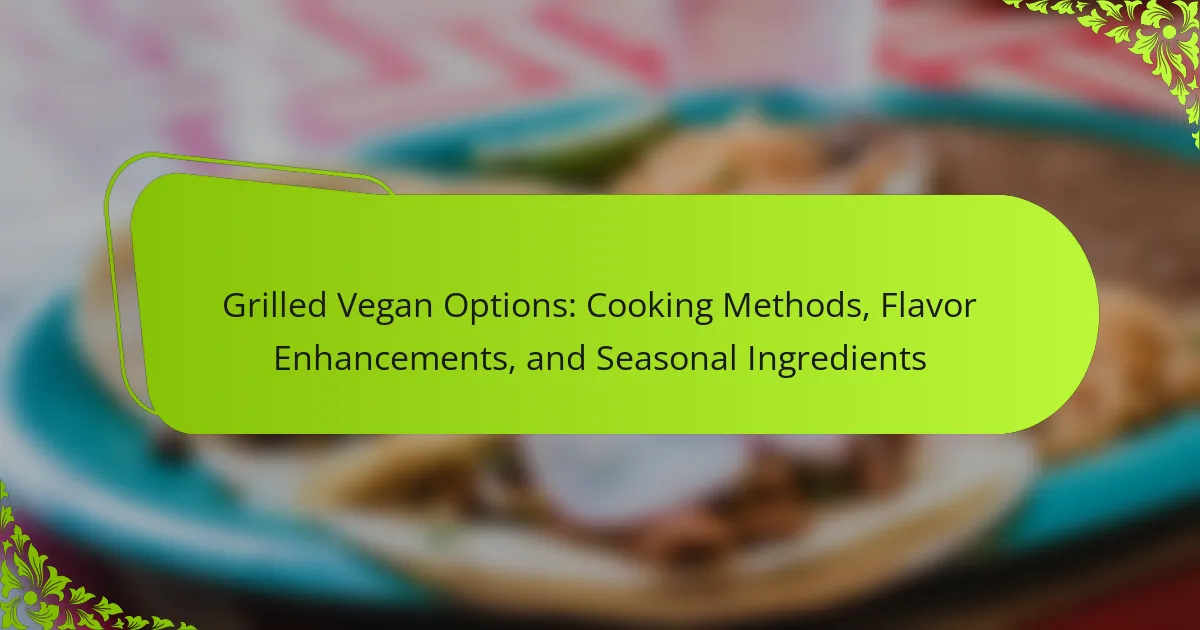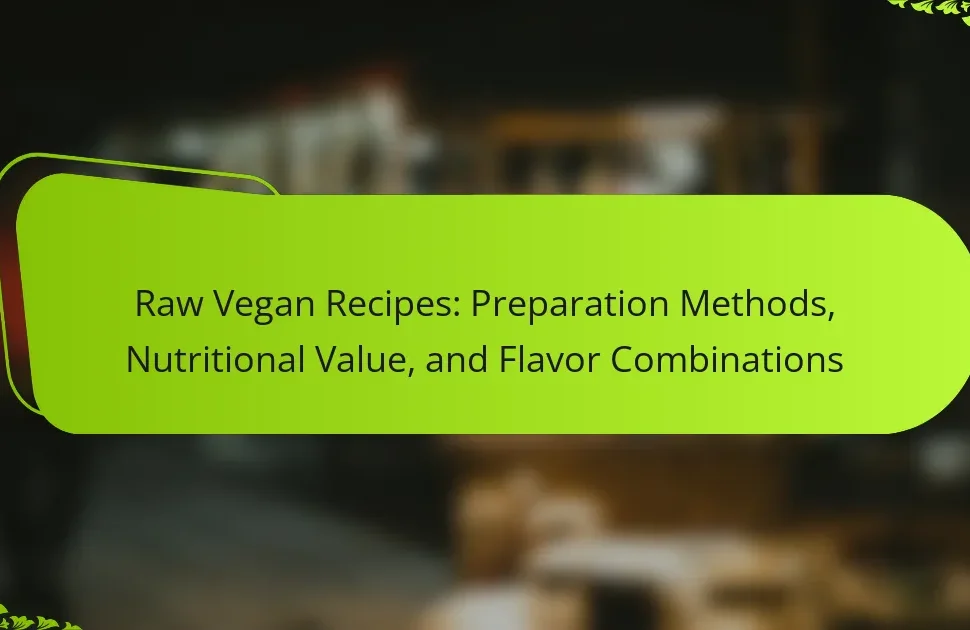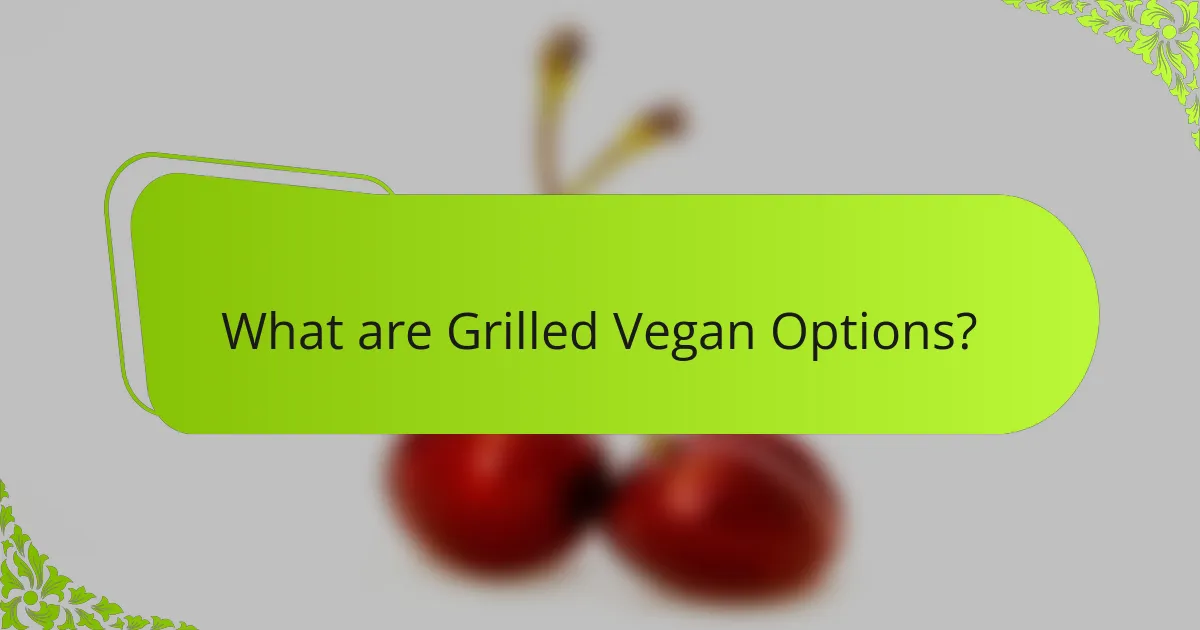
What are Grilled Vegan Options?
Grilled vegan options include a variety of plant-based foods suitable for grilling. Common choices are vegetables like bell peppers, zucchini, and eggplant. Grilled fruits such as pineapples and peaches also make excellent options. Tofu and tempeh are popular protein sources that absorb marinades well. Veggie burgers and skewers can be created using grains and legumes. These options offer diverse flavors and textures. Grilling enhances the taste of these foods while maintaining their nutritional value.
How can grilling enhance vegan dishes?
Grilling enhances vegan dishes by imparting a smoky flavor and creating appealing textures. The high heat of grilling caramelizes natural sugars in vegetables, intensifying their sweetness. This method also adds a satisfying char that enhances visual appeal. Grilling can improve the nutritional profile by retaining vitamins and minerals compared to boiling. Studies show that grilling vegetables can preserve antioxidants better than other cooking methods. Additionally, grilling allows for the infusion of marinades, which can elevate the overall taste. The versatility of grilling accommodates a variety of plant-based ingredients, making it suitable for diverse vegan recipes.
What types of vegetables are best for grilling?
Bell peppers, zucchini, asparagus, and corn are among the best vegetables for grilling. Bell peppers have a sweet flavor and hold up well on the grill. Zucchini has a mild taste and cooks quickly, making it ideal for grilling. Asparagus retains its crunch and develops a smoky flavor when grilled. Corn on the cob becomes sweet and charred, enhancing its natural sugars. These vegetables are commonly used in grilling due to their texture and flavor profiles. Grilling enhances their taste and adds a smoky aroma, making them popular choices for outdoor cooking.
How does grilling affect the texture of vegan proteins?
Grilling enhances the texture of vegan proteins by creating a firm outer crust while retaining moisture inside. This cooking method causes the Maillard reaction, which adds a desirable flavor and color. For example, grilled tofu often becomes crispy on the outside and tender on the inside. Similarly, vegetables like eggplant and zucchini develop a charred texture that complements their natural flavors. Studies show that grilling can also reduce the water content in plant-based proteins, concentrating their flavors. This process improves the overall mouthfeel, making grilled vegan proteins more appealing in dishes.
Why choose vegan options for grilling?
Vegan options for grilling are healthier and more sustainable than traditional meat options. They often contain lower levels of saturated fat and cholesterol. Plant-based foods are rich in fiber, vitamins, and antioxidants. Choosing vegan options reduces the carbon footprint associated with meat production. Research indicates that plant-based diets can lower the risk of chronic diseases. Grilling veggies, tofu, and plant-based proteins enhances their flavors through caramelization. Many vegan grilling options are versatile and can be marinated for added taste. The variety of seasonal vegetables available increases the appeal of vegan grilling.
What health benefits are associated with grilled vegan meals?
Grilled vegan meals offer numerous health benefits. They are typically low in saturated fats and cholesterol-free. This can contribute to better heart health. Grilling vegetables enhances their flavor while preserving nutrients. For instance, grilling can increase the availability of antioxidants in tomatoes and peppers. Vegan meals are rich in fiber, which supports digestive health. Increased fiber intake can also help regulate blood sugar levels. Moreover, grilled vegan meals often include a variety of colorful vegetables. This variety ensures a wide range of vitamins and minerals. Studies show that a plant-based diet can lower the risk of chronic diseases.
How do grilled vegan options compare to traditional grilling options?
Grilled vegan options differ from traditional grilling options primarily in their ingredients and flavor profiles. Vegan grilling often features plant-based proteins like tofu, tempeh, and seitan. These ingredients provide a different texture and taste compared to meat. Traditional grilling typically uses animal products, which have distinct flavors and juiciness due to fat content.
Nutritionally, grilled vegan options are often lower in calories and saturated fats. They can be rich in fiber, vitamins, and antioxidants. Research shows that plant-based diets can reduce the risk of chronic diseases. Flavor enhancement in vegan grilling often involves marinades and spices, which can create complex flavors.
On the other hand, traditional grilling relies on the natural flavors of meat, complemented by marinades and rubs. Cooking times also vary; vegan options may require less time to cook. This can lead to quicker meal preparation. Overall, grilled vegan options offer a healthier, lower-fat alternative with diverse flavors compared to traditional grilling.
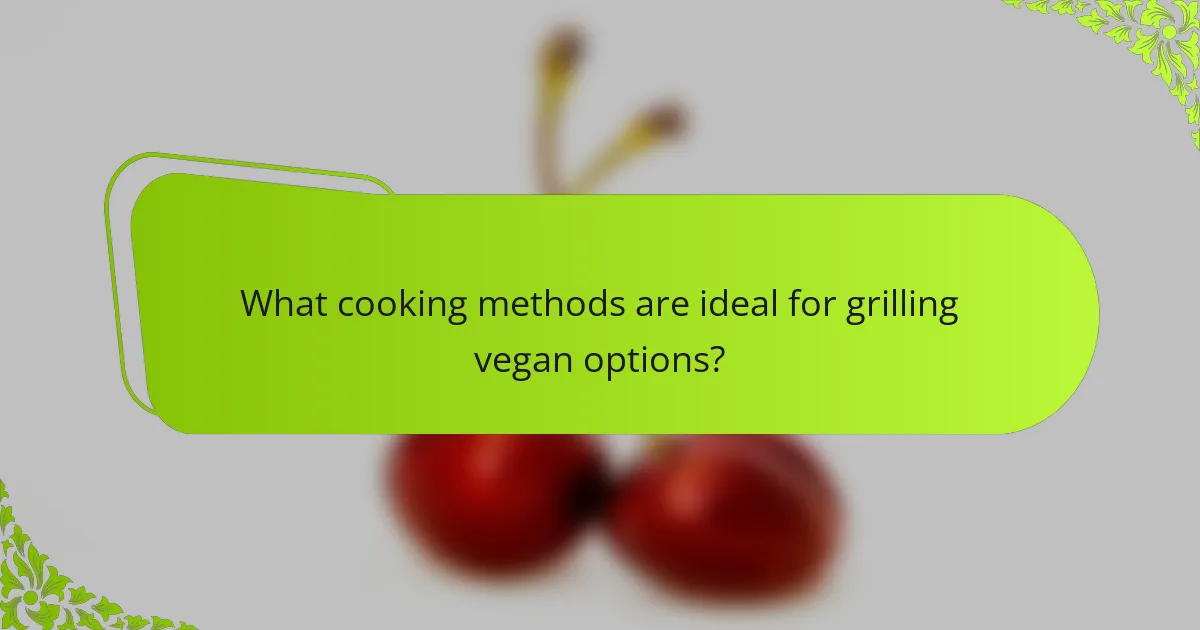
What cooking methods are ideal for grilling vegan options?
Direct grilling and indirect grilling are ideal cooking methods for grilling vegan options. Direct grilling involves placing food directly over the heat source. This method is effective for cooking vegetables, tofu, and veggie burgers quickly. Indirect grilling uses heat surrounding the food, suitable for larger items like stuffed peppers or whole corn on the cob. Both methods allow for the infusion of smoky flavors. Using marinades enhances taste and tenderness. Grilling times vary based on the specific vegan item. For example, bell peppers may take about 10-15 minutes, while tofu could take 5-7 minutes per side.
How does direct grilling work for vegan ingredients?
Direct grilling for vegan ingredients involves cooking them directly over high heat. This method enhances the natural flavors of vegetables, fruits, and plant-based proteins. Ingredients like bell peppers, zucchini, and eggplant can be sliced and placed on a grill. The high temperature caramelizes sugars and creates grill marks. This process adds a smoky flavor and improves texture. For optimal results, marinating ingredients before grilling can enhance taste. Vegan proteins like tofu and tempeh also benefit from direct grilling, absorbing flavors from marinades. Studies show that grilling can retain nutrients in vegetables while adding appealing charred flavors.
What are the best practices for direct grilling vegetables?
The best practices for direct grilling vegetables include selecting fresh, seasonal vegetables and cutting them into uniform sizes for even cooking. Preheating the grill ensures that vegetables sear properly, enhancing flavor. Oiling the grill grates prevents sticking, while lightly coating vegetables with oil adds moisture and flavor. Using skewers or grilling baskets can help manage smaller pieces. Direct grilling should be done over medium-high heat to achieve a good char without burning. Monitoring cooking time is crucial, as different vegetables require varying times to cook thoroughly. For example, bell peppers and zucchini typically grill well in about 5-7 minutes.
Which vegan proteins are suitable for direct grilling?
Tofu, tempeh, and seitan are suitable vegan proteins for direct grilling. Tofu has a firm texture that holds up well on the grill. It absorbs marinades effectively, enhancing its flavor. Tempeh is denser than tofu, providing a nutty taste. Its fermentation process contributes to its unique profile. Seitan, made from wheat gluten, mimics the texture of meat. It can be seasoned and grilled to create a satisfying meal. These proteins are versatile and can be paired with various marinades and spices. Their grilling enhances both texture and flavor, making them popular choices for vegan grilling.
What are the benefits of indirect grilling for vegan options?
Indirect grilling for vegan options allows for even cooking and enhanced flavor. This method reduces the risk of burning delicate plant-based ingredients. It helps maintain moisture in vegetables, tofu, and other vegan proteins. Indirect grilling also allows for the infusion of smoky flavors without direct exposure to flames. This technique is ideal for larger cuts of vegetables and marinated items. Research indicates that indirect grilling can enhance the texture of grilled vegetables, making them more appealing. Additionally, it promotes a healthier cooking method by minimizing charring, which can produce harmful compounds. Overall, indirect grilling is beneficial for achieving optimal taste and texture in vegan dishes.
How can indirect grilling enhance flavor in vegan dishes?
Indirect grilling enhances flavor in vegan dishes by allowing even cooking and smoke infusion. This method uses indirect heat, preventing burning and preserving moisture. As a result, vegetables and plant-based proteins develop a rich, smoky taste. The slow cooking process caramelizes natural sugars, enhancing sweetness and depth. Ingredients like mushrooms and eggplants absorb smoke flavor effectively. Research indicates that grilling can enhance the sensory attributes of food, making it more appealing. Studies show that indirect grilling can improve flavor profiles by up to 30%.
What types of dishes are best suited for indirect grilling?
Dishes best suited for indirect grilling include larger cuts of meat, whole poultry, and dense vegetables. These items benefit from slow cooking and even heat distribution. Examples include whole chickens, pork shoulders, and beef briskets. Additionally, root vegetables like potatoes and carrots cook well using this method. Indirect grilling allows for a smoky flavor without burning. This technique is ideal for foods that require longer cooking times. It ensures thorough cooking while retaining moisture and tenderness.
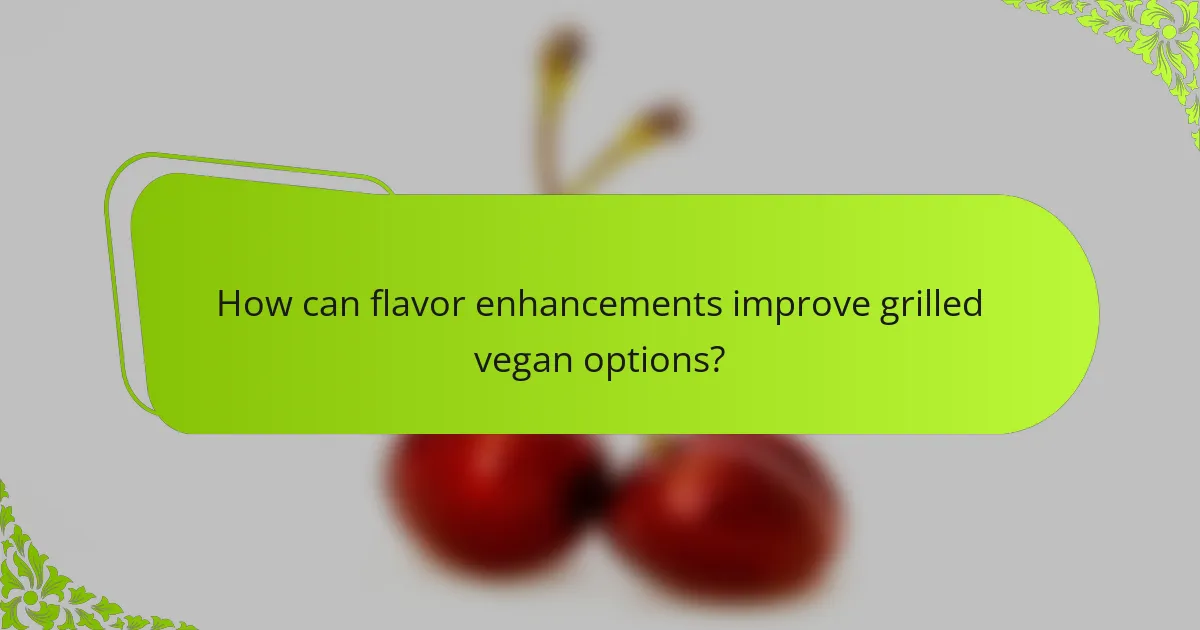
How can flavor enhancements improve grilled vegan options?
Flavor enhancements can significantly improve grilled vegan options by intensifying taste and complexity. These enhancements include marinades, spices, and herbs. Marinades can infuse plant-based proteins with deeper flavors. For instance, a marinade with soy sauce and garlic can add umami richness. Spices like smoked paprika and cumin can introduce warmth and depth. Fresh herbs such as basil and cilantro can brighten dishes and add freshness.
Research indicates that flavor enhancements can increase consumer satisfaction. A study by the Journal of Food Science found that well-seasoned vegan dishes are more appealing to diners. Additionally, flavor enhancements can mask any inherent bitterness in some vegetables. This makes grilled options more enjoyable and palatable. Overall, flavor enhancements are essential for creating delicious grilled vegan meals.
What marinades work best for grilled vegan dishes?
Citrus-based marinades work best for grilled vegan dishes. These marinades often include ingredients like lemon, lime, or orange juice. They provide a bright, fresh flavor that enhances vegetables and plant proteins. Soy sauce or tamari can be added for umami depth. Garlic and ginger are also common additions, contributing aromatic qualities. Olive oil helps in achieving a smooth texture and prevents sticking on the grill. Herbs like cilantro or basil can offer additional layers of flavor. Marinades should be allowed to sit for at least 30 minutes to effectively infuse the ingredients. This method is widely recommended by culinary experts for optimal flavor absorption.
How do different herbs and spices elevate grilled flavors?
Different herbs and spices enhance grilled flavors by adding depth and complexity. They introduce unique aromas and tastes that complement grilled foods. For example, rosemary imparts a piney flavor, while thyme adds earthiness. Spices like paprika and cumin provide warmth and smokiness. Marinades with garlic and ginger can tenderize and infuse flavors deeply. Studies show that herbs can also reduce the formation of harmful compounds during grilling. This makes them beneficial for health while enhancing taste.
What are some unique flavor combinations for grilling?
Miso and maple syrup create a unique sweet and savory glaze for grilled vegetables. This combination enhances the umami flavor profile. Another option is chimichurri with citrus zest, which adds freshness and acidity. The herbs in chimichurri complement grilled items well. Additionally, smoked paprika and lime juice offer a smoky and tangy twist. This pairing works particularly well with mushrooms and corn. Lastly, coconut milk and curry powder can provide an exotic flavor for grilled tofu. This combination infuses rich flavors into plant-based proteins.
How does seasoning impact the taste of grilled vegan options?
Seasoning significantly enhances the taste of grilled vegan options. It adds depth and complexity to the flavors of plant-based ingredients. Common seasonings include herbs, spices, and marinades. These elements can transform the natural flavors of vegetables, tofu, or tempeh. For example, garlic and paprika can introduce savory and smoky notes. A study by the Journal of Food Science found that marinating vegetables enhances their flavor profile. The right seasoning can also balance the natural sweetness of certain vegetables. Overall, seasoning is essential for elevating the taste of grilled vegan dishes.
What types of seasonings should be avoided?
Certain seasonings should be avoided when preparing grilled vegan options. High-sodium seasonings can lead to health issues such as hypertension. Seasonings containing artificial additives may cause allergic reactions in some individuals. Spicy seasonings can overpower the delicate flavors of vegan ingredients. Additionally, seasonings with added sugars can negate the health benefits of a vegan diet. Finally, certain preservatives can affect the overall quality of the dish. It is best to choose fresh herbs and natural spices for healthier grilling options.
How can seasoning techniques differ between vegetables and proteins?
Seasoning techniques differ significantly between vegetables and proteins due to their distinct textures and flavor absorption rates. Vegetables often require lighter seasoning, as they can easily become overwhelmed by strong flavors. Common techniques for vegetables include marinating, tossing with herbs, or using citrus for brightness.
In contrast, proteins benefit from more robust seasoning techniques. They can absorb flavors more deeply, allowing for marinades that include oils, acids, and spices. Techniques such as dry rubbing or brining are effective for proteins.
Research shows that proteins, like meat and tofu, can retain marinades better than vegetables, enhancing their flavor profile. This difference is crucial in achieving the desired taste in grilled dishes.
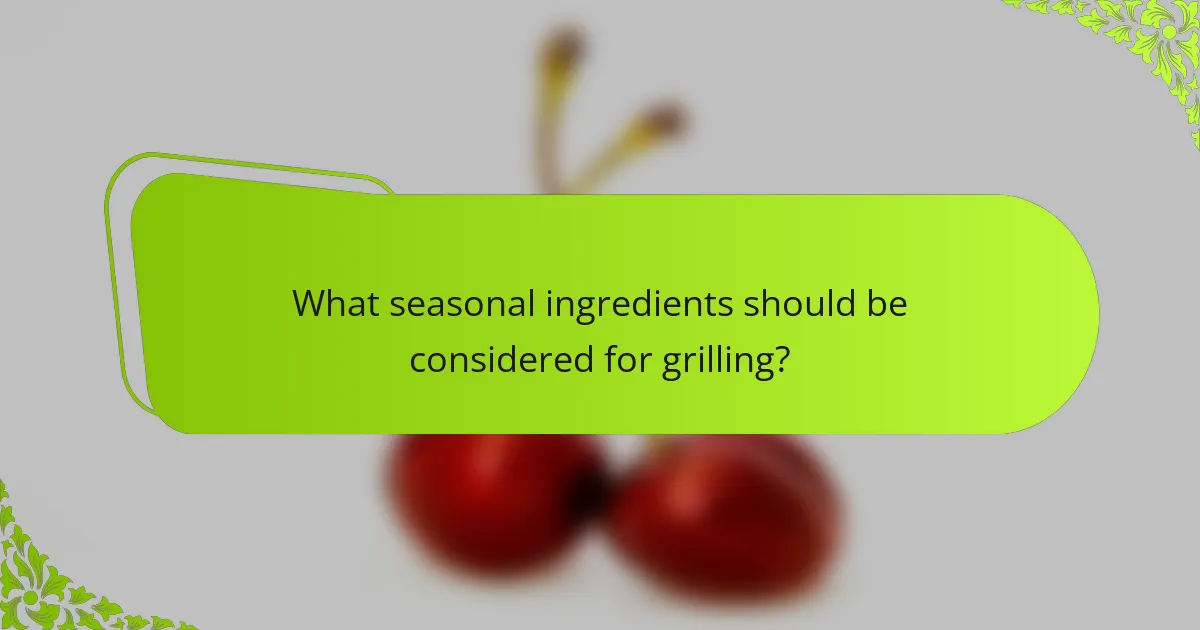
What seasonal ingredients should be considered for grilling?
Seasonal ingredients for grilling include vegetables and fruits that are at their peak during specific times of the year. In spring, asparagus and artichokes are excellent choices. Summer brings a bounty of zucchini, bell peppers, and corn. Fall is ideal for grilling hearty vegetables like pumpkins and sweet potatoes. Winter can feature root vegetables such as carrots and parsnips. These ingredients enhance flavor and texture when grilled. Grilling seasonal produce maximizes taste and nutritional value.
How do seasonal vegetables enhance grilled vegan meals?
Seasonal vegetables enhance grilled vegan meals by providing fresh flavors and optimal nutrition. These vegetables are harvested at their peak ripeness, ensuring better taste and texture. For example, summer squash and bell peppers add vibrant colors and diverse flavors to dishes. Seasonal vegetables often contain higher nutrient levels compared to out-of-season options. They also support local agriculture, reducing the carbon footprint associated with transportation. Grilling seasonal vegetables caramelizes their natural sugars, intensifying their flavors. This method creates a smoky depth that complements vegan proteins. Seasonal produce can also inspire creativity in meal preparation, encouraging diverse recipes.
What are the top seasonal vegetables for grilling in summer?
The top seasonal vegetables for grilling in summer include zucchini, bell peppers, corn, eggplant, and asparagus. Zucchini has a high water content, making it tender when grilled. Bell peppers add sweetness and vibrant color to dishes. Corn, especially when grilled on the cob, provides a smoky flavor. Eggplant has a unique texture that absorbs marinades well. Asparagus retains its crunch and offers a distinct taste. These vegetables peak in summer, ensuring freshness and flavor for grilling.
How can winter vegetables be creatively grilled?
Winter vegetables can be creatively grilled by utilizing marinades and diverse grilling techniques. Marinating vegetables like Brussels sprouts, carrots, and cauliflower enhances their natural flavors. A mixture of olive oil, balsamic vinegar, garlic, and herbs can be effective. Skewering vegetables adds visual appeal and makes flipping easier. Using a grill basket allows smaller pieces to cook evenly without falling through the grates.
Grilling at varying temperatures can create different textures. High heat can achieve a charred exterior, while lower heat allows for thorough cooking. Adding spices such as smoked paprika or cumin can introduce unique flavors. Incorporating citrus zest or juice can brighten the dish.
Experimenting with wood chips, like hickory or mesquite, can impart a smoky flavor. Combining grilled winter vegetables with grains or legumes can create a hearty meal. These methods not only enhance taste but also showcase the versatility of winter produce.
What fruits are excellent for grilling alongside vegan options?
Pineapple, peaches, and watermelon are excellent fruits for grilling alongside vegan options. Pineapple caramelizes well, enhancing its sweetness. Peaches become juicy and tender, adding a rich flavor. Watermelon, when grilled, offers a unique smoky taste. These fruits complement various vegan dishes. Grilling enhances their natural sugars, making them more flavorful. They can be served as sides or desserts.
How do grilled fruits complement savory dishes?
Grilled fruits enhance savory dishes by adding sweetness and complexity. The caramelization process during grilling intensifies their natural sugars. This contrast balances the saltiness or spiciness of savory ingredients. For instance, grilled peaches can complement grilled meats or salads. Similarly, grilled pineapple pairs well with spicy dishes, providing a refreshing contrast. The smoky flavor from grilling also adds depth to the overall dish. Studies show that flavor pairings, like sweet and savory, elevate dining experiences. Thus, incorporating grilled fruits can create a harmonious blend of flavors.
What are the best practices for grilling fruits?
The best practices for grilling fruits include selecting ripe, firm fruits and cutting them into uniform pieces for even cooking. Pre-soaking fruits like peaches or pineapples in a mixture of sugar and water enhances sweetness and caramelization. Using a grill basket or skewers prevents smaller pieces from falling through the grates. Preheating the grill to medium heat ensures a good sear while avoiding burning. Basting fruits with olive oil or a flavored syrup adds moisture and flavor. Turning fruits gently with tongs helps avoid damage and ensures even grilling. Grilling times vary; for example, peaches may take 3-4 minutes per side. Finally, serving grilled fruits with a sprinkle of sea salt or fresh herbs enhances their flavor.
What tips can enhance the grilling experience for vegan options?
Marinating vegan options enhances flavor and texture during grilling. Use a mix of olive oil, vinegar, and herbs for best results. Allow vegetables or plant-based proteins to marinate for at least 30 minutes. Preheating the grill ensures even cooking and prevents sticking. Use medium heat for delicate items like tofu or mushrooms. Incorporating wood chips can add a smoky flavor to grilled dishes. Skewering smaller pieces helps prevent them from falling through the grill grates. Regularly baste with marinade to keep items moist during cooking. Finally, experimenting with different seasonal vegetables can elevate the overall grilling experience.
Grilled vegan options encompass a variety of plant-based foods ideal for grilling, including vegetables, fruits, and proteins like tofu and tempeh. The article explores how grilling enhances flavors and textures, discusses optimal cooking methods, and highlights the health benefits associated with grilled vegan meals. It also examines seasonal ingredients that improve taste and nutrition, along with best practices for marinating and seasoning. Key comparisons between vegan and traditional grilling options are presented, emphasizing the advantages of plant-based grilling for health and sustainability.
